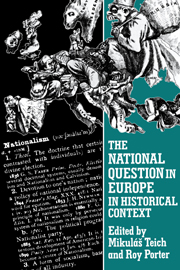Book contents
- Frontmatter
- Contents
- List of maps
- Notes on contributors
- Acknowledgements
- Introduction
- 1 The British Isles: Celt and Saxon
- 2 The making of the French nation
- 3 The national question in Italy
- 4 The roots of the national question in Spain
- 5 Shifting nationalism: Belgians, Flemings and Walloons
- 6 The nation in German history
- 7 Nationalism and nation-state in Germany
- 8 The national identity of the Austrians
- 9 The Czechs
- 10 The national question in Hungary
- 11 The union of Dalmatia with northern Croatia: a crucial question of the Croatian national integration in the nineteenth century
- 12 The national question in Poland in the twentieth century
- 13 Finland: from Napoleonic legacy to Nordic co-operation
- Index
1 - The British Isles: Celt and Saxon
Published online by Cambridge University Press: 30 November 2009
- Frontmatter
- Contents
- List of maps
- Notes on contributors
- Acknowledgements
- Introduction
- 1 The British Isles: Celt and Saxon
- 2 The making of the French nation
- 3 The national question in Italy
- 4 The roots of the national question in Spain
- 5 Shifting nationalism: Belgians, Flemings and Walloons
- 6 The nation in German history
- 7 Nationalism and nation-state in Germany
- 8 The national identity of the Austrians
- 9 The Czechs
- 10 The national question in Hungary
- 11 The union of Dalmatia with northern Croatia: a crucial question of the Croatian national integration in the nineteenth century
- 12 The national question in Poland in the twentieth century
- 13 Finland: from Napoleonic legacy to Nordic co-operation
- Index
Summary
High the vanes of Shrewsbury gleam
Islanded in Severn stream …
The flag of morn in conqueror's state
Enters at the English gate:
The vanquished eve, as night prevails,
Bleeds upon the road to Wales.
A. E. Housman, The Welsh MarchesOf the stormy, often bloody history of the British Isles, a great part has consisted of the Germanic occupation of what is now England, followed by a millennium of English penetration into Celtic regions to the west and north, and their assimilation or conquest. Pushed back into hills and backlands, and with a malign social and psychological heritage from times when they themselves were alien conquerors, the Celtic peoples were left with little chance of a healthy evolution. In turn their fate could scarcely fail to have a malign influence on the Germanic mixture which was supplanting them — itself to a great extent composed of ‘Celts’ forcibly or otherwise transformed. In many ways this can be called the formative experience of the English people, especially of its ruling classes, leaving it as Cobbett said, with its treatment of Ireland in mind, ‘arrogant, greedy, fond of power, and of dominion all over the world’. There has been more than one parallel in Europe to this situation of a stronger people learning to be a ‘nation’ by dominating weaker, more ‘backward’ ones; the closest is the rise of Austria through subjugation of Slav territories on its mountainous south and south-east, and then of the Slav kingdom of Bohemia.
- Type
- Chapter
- Information
- Publisher: Cambridge University PressPrint publication year: 1993
- 6
- Cited by



